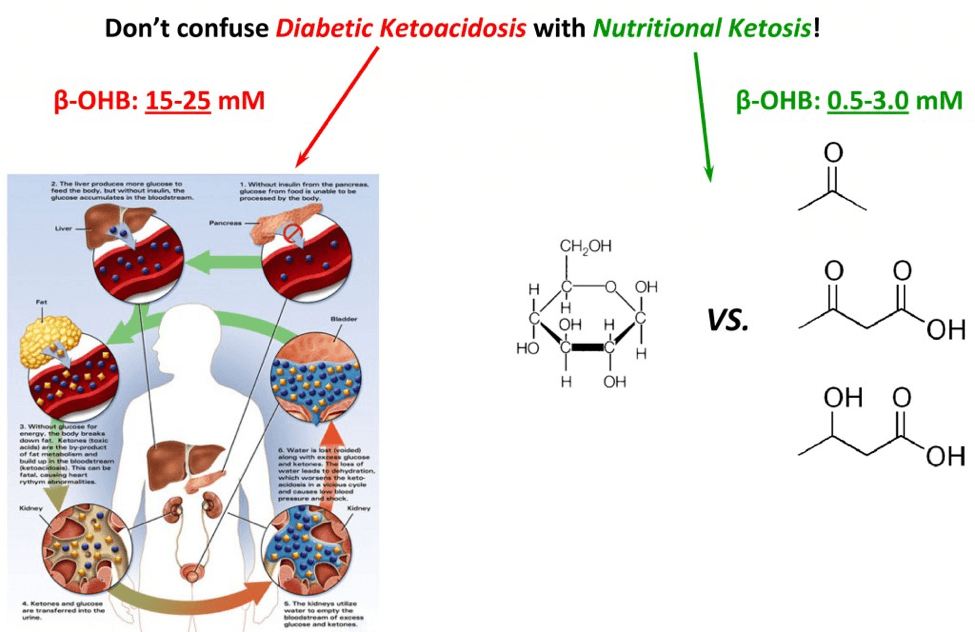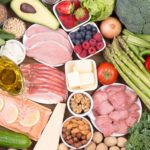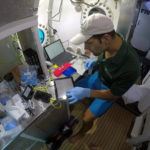You may have heard from your doctor that ketosis is a life-threatening condition. If so, your doctor is confusing diabetic ketoacidosis (DKA) with nutritional ketosis, or keto-adaptation.
First, some semantics. Our body can produce, from fat and some amino acids, three ketone bodies (a “ketone” refers to the chemical structure where oxygen is double-bonded to carbon sandwiched between at least 2 other carbons). These ketone bodies we produce are: acetone, acetoacetone, and beta-hydroxybutyrate (B-OHB). [For anyone who is interested, they are the 3 most right structures on the figure, below.]
Why do we make ketones? For starters, it’s a vital evolutionary advantage. Our brain can only function with glucose and ketones. Since we can’t store more than about 24 hours’ worth of glucose, we would all die of hypoglycemia if ever forced to fast for more than a day. Fortunately, our liver can take fat and select amino acids (the building blocks of proteins) and turn them into ketones, first and foremost to feed our brains. Hence, our body’s ability to produce ketones is required for basic survival.
What is diabetic ketoacidosis? When diabetics (usually Type I diabetics, but sometimes this occurs in very late-stage, insulin-dependent, Type II diabetics) fail to receive enough insulin, they go into an effective state of starvation. While they may have all the glucose in the world in their bloodstream, without insulin, they can’t get any into their cells. Hence, they are effectively going into starvation. The body does what it would do in anyone – it starts to make ketones out of fat and proteins. Here’s the problem: the diabetic patient in this case can’t produce any insulin, so there is no feedback loop and they continue to produce more and more ketones without stopping. By the time ketone levels (specifically, beta-hydroxybutyrate) approach 15 to 25 mM, the resulting pH imbalance leads to profound metabolic derangement and the patient is critically ill.
But this state of metabolic derangement is not actually possible in a person who can produce insulin, even in small amounts. The reason is that a feedback loop prevents the ketone level from getting high enough to cause the change in pH that leads to the cascade of bad problems. A person who is said to be “keto-adapted,” or in a state of nutritional ketosis, generally has beta-hydroxybutyrate levels between about 0.5 and 3.0 mM. This is far less than the levels required to cause harm through acid-base abnormalities.
Keto-adaption is a state, achieved through significant reduction of carbohydrate intake (typically to less than 50 grams per day) and moderate protein, where the body changes from relying on glycogen as its main source of energy to relying on fat. Specifically, the brain shifts from being primarily dependent on glucose, to being primarily dependent on beta-hydroxybutyrate. This has nothing to do with what a diabetic patient is experiencing in DKA, but does illustrate how poorly informed and quick to react the medical community is. DKA and nutritional ketosis (or keto-adaptation) have as much in common as a house fire and a fireplace.
Photo by Andrew Yardley on Unsplash








Hello,
Recently I started a low stach/carb diet for Ankylosing Spondylitis with good results, decrease of pain and stiffness but I found some articles pointing at possible dangerous long term side effects of such a diet (kidney, cardiac, bone problems etc.). This is one of the studies: https://www.pcrm.org/health/reports/analysis-of-health-problems-associated-with-high
I wanted to know if any of you guys who have been on a ketogenic diet for a long time have experience any of the side effects and if there are ways to avoid them. I’m especially concerned about the kidney problems caused by the high protein intake.
Thanks
Sergio, this isn’t a study. It’s a report by a vegan group (PCRM) known for making pretty outrageous claims to support their agenda.
Hello Dr. Attia, I am a 28 y/o female, with over 40% body fat (205lbs weight). I actually exercise 3-5 times a week burning about 200-500 calories each time. I am borderline diabetic. I started a low-carb diet two days ago. I have been a vegetarian before (approx. 2 years as a teen). When I was 22 y/o I started an Atkins diet, but was only on it for a few weeks. My family was worried that I would get sick; I regret leaving it since I lost 13 pounds. I want to lose serious body fat (goal 25% body fat), especially from my midsection. I take a Centrum multivitamin, fish oil, and Biotin (for Alopecia) daily. I have been obsessed with green tea, chai, and oolong tea since childhood; two cups a day of each is typical. Do you recommend I take any other supplements?
Also, I have had LBM since I started the low-carb diet. I am having a hard time eating super fatty foods. I like the meat, but can only stomach pork chops and chicken breast for some reason. I think it might be psychological, but I will try to incorporate more fat. I loved fatty foods when I accompanied them with carbs. What do you recommend for the LBM?
I have experienced a headache during morning hours as well. I feel exhausted too. Any recommendations?
Thanks in advance for any advice. I appreciate you sharing your vast knowledge.
Dr Attia, I was wondering if it would be safe for a person with diabetes insipidus to follow the Ketogenic Diet?
Hi there,
My son is type 1 diabetic and was in DKA when we first got the diagnosis. My question surrounds the idea that he still has beta cells or not. His endo said he is in the honey moon stage which would mean he is still producing small amounts of insulin. You said Metoboilc derangement is not possible in someone still producing insulin even in small amounts. I am hopeful my Son still produces insulin and or has beta cells to regenerate, but he must not because he expeinced DKA?
Dr. Attia,
I’m about two weeks into my Ketogenic Diet and I’m following it exactly as advised by my doctor. I’ve noticed the last few days my appetite has really decreased-I’m not feeling hunger at all. I’m also experiencing boughts of nausea (the thought of eating makes me green!). Other than that, I’m feeling fine. Are these side effects common a few weeks into the keto diet?
Thanks
Liz, I wouldn’t say that’s common, per se, but certainly some people on a ketogenic diet feel much less hungry that before. The nausea, if it occurs, is usually transient. Why did your doctor prescribe a KD?
I have approximately 25 pounds to lose and haven’t had much success the past two years with other forms of dieting, so KD was recommended to me. I also have an underactive thyroid which I am on medication for and is under control. Thanks again for all the information you’ve provided on this subject!
Hi Dr,
I am on a low carb high protien diet (Banting Diet). I need to loose at least 60kg, i am a type 2 diabetic, have been eating this way since 2/1/2015. I am not in ketosis and have not lost any weight yet either. Must i be in ketosis to be able to loose the weight, i will admit that i am very soft (if that makes sence). I have asked alot of people if there is something i am doing wrong and they all seam to think i am doing everything right. Any comments please.
Many thanks
Liz
Peter,
I’m 66 years old, was on strict Paleo for 3 years. During that time my HDL went higher, my LDL increased a little and my triglycerides shrank to 88.
4 months ago I tried nutritional ketosis, feel very good, the best I’ve felt in many years. Just had an NMR lipoprofile. My LDL-P is very bad 2221 but what really blew me away was a triglyceride score of 836! That’s almost an order of magnitude greater. Any clue what might be happening?
Thanks for your great website and YouTube videos.
Dave in Oregon
Yes, Tom Dayspring has written up a great case on this on LecturePad (you’ll need to register, but it’s free). Short answer: ketosis probably not for you, at least not with current proportions of fatty acids.
For anyone who hasn’t seen it, and might be interested in an entertaining discussion by Dr. Thomas Dayspring on cholesterol, low carb,fat,ketosis etc.here’s a link to the 2012 “interview” of Dr. Dayspring by kick boxer Michael Andruela. There are many other presentations by Dr. Dayspring, but I found this one to be a non stop hoot chock full of good stuff including reference to his own weight issue and shout-outs to Peter and to Gary Taubes. Dr. Dayspring, aka Dr. Lipid, is quite a character.
https://www.youtube.com/watch?v=joTrnnFHw-E
Given the less water and carb retention in the muscles would someone on a ketogenic diet have less vascularity (‘pump’ in general) compared to someone with an identical body composition but on a high carb diet?
Stephanie keto person says there should be more. See youtube.
As an acting President –
The FDA – USDA – would have all weapons taken from them and would be forbidden from using same in any and all events or operations –
Those involved in raw dairy shut down events would be summarily fired and if I can arrange it – would be drafted into a special army of my creation where digging foxholes in the Arctic was there new job –
Suffice to say – heads would roll and I would not hesitate to use any power at my disposal –
My mother is a type 1 diabetic. When she was first diagnosed she was told to eat a diet that was high in carbs and low in sugar but that just made her blood sugar levels too high, then with insulin taken would maks her levels too low. She was recently admitted to hospital with ketoacidosis as she had stopped taken her insulin all together.
She is now back on the insulin and been to a specialist dietician and has been told to eat low carbs and told to take 1ml of insulin for every 10grams of carbohydrates. Anyway after long searching i found this site and the keto diet, would this be suitable for her to do or would it put her at risk of ketoacidosis again?
Any help would be very welcome
dear peter:
I am a nurse from China ,a big fan of your diet ,i hope someday i can use your diet in my hospital ,looking forward of your book !
Dr. Attia,
So if I’m having issues with nocturnal leg cramps, occasional heart palpitations, and feeling cold, should I try to get more K? I’ve been drinking bone broth with Himilayan and/or Celtic Sea salt, taking natural calm Mg supplement, drinking Him salt water, eating an avocado every day and spinach most days, and drinking apple cider vinegar in water. I’m not sure what is wrong. I’m thinking I may need more K. Also been using topical Mg and that hasn’t helped either. I wake up in the am cold and hungry and sometimes have a stomach ache after I eat. I’ve also been taking extra Fe too as I just got off of my period and they are always heavy 🙁 (in fact this one was so heavy that I almost blacked out in P-Chem lab and had to go lie down to bring my bp back up). Thanks for any help.
I forgot to mention that I also take mineral supplements (SeaSel).
Dr. Attia, I believe it was either Phinney or Volek that posted a diagram describing the area between nutritional ketosis and DKA (3.0mM up to 10mM) as “starvation ketosis”. The colors on the keto sticks are admittedly very hard for me to read but the best I can tell, it says I am somewhere between 4 and 5 mM. Is this range of ketosis a concern? I have been at it for about 5 weeks and lost about 20 pounds (225 -> 205). It was basically 4-5 pounds per week minus one decadent week in California where i only lost half a pound 🙂 AM I BEING TOO STRICT in my carb intake? I have been eating well but I have felt no hunger whatsoever since I began and so it’s been quite easy for me not to overeat. Keep up the great work!
p.s. I am not diabetic.
After a 4 days of adaptation and 3 days of full on almost no carbs, high fat and protein diet [plus 60-70 grams of green veg a day], my ketostix are already reading a level of 8mmol/L. I note you said most people have a ketone level of 0.5-3. Should I be worried? Is there any danger? Why has my level gone so high so quickly? It is safe when on thyroxin tablets?
Many thanks
Quick question:
i don’t understand what holds a healthy person on a ketogenic diet (near zero cho and insulin) from going to ketoacidosis, like a diabetic?
Their pancreas secretes insulin to blunt the ketones.
Even without carbohydrates?
I fasted for forty days – water only, and did not die of hypoglycemia. I know a lot of people who do this for religious reasons. They are fine.
Dr. Attia,
As a type 1 diabetic myself, the idea of going into DKA is quite scary and something I don’t want to experience. With that being said, I would love to go into nutritional ketosis and reap the benefits that I keep hearing about. How is this possible for a person like me who’s body doesn’t produce insulin. I take injections with every meal and have a relatively high carbohydrate diet. I am a division 1 NCAA swimmer and I’ve found that I perform my best in this way.
Thanks for you awesome feedback and blog posts.
Phillip, NK in T1D requires (smart) physician intervention at the outset. But it may be overkill. CHO restriction without NK probalby offers 80% of the beneit from the standpoint of glycemic control and access to fat stores.
Dr. Attia,
Thank you for responding. 80% still seems worth it but are you saying I will not reach NK as a type 1 diabetic? Eating Carbs or not and not taking insulin still seems like a bad idea. My goal is to emulate a normal non diabetic and the way their body would respond.
hey I am a swim coach who is now working with my first type 1 diabetic. I have had tremendous success with my own comeback to swimming with LCHF and I am curious if this route will help my athlete to be able to get into a larger distance training load? I would love to hear what you have found in your training at the D1 level. After seeing some triathletes who have had a great adaptation to LCHF as type 1’s it would really help me to hear some advice on how to help this girl and her doctor manage a transition to see if this is a good path. My transition was easy, and I have done a lot of reading (and writing) on the subject but without prior experience with type 1 diabetes it makes me nervous to make this recommendation.